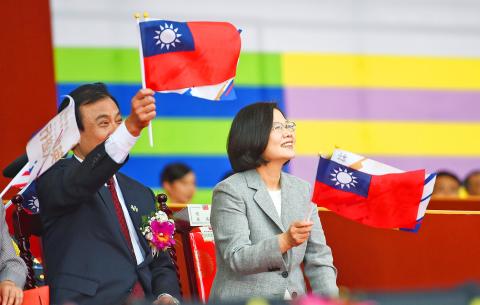Beijing has established a government agency charged with disseminating disinformation in Taiwan for the purposes of influencing public morale and causing rifts within society, a source at a national security agency has said.
The confirmation came after President Tsai Ing-wen’s (蔡英文) Double Ten National Day speech in which she described the need for alertness in the face of widespread disinformation.
China’s use of “fake” news has also been recognized by Japanese media, including the Sankei Shimbun, the Yomiuri Shimbun and the Asahi Shimbun.

Photo: Liu Hsin-de, Taipei Times
The newspapers all described as fake news Chinese reports of buses dispatched by the Chinese consulate in Osaka to pick up passengers stranded at Kansai International Airport following Typhoon Jebi early last month.
Following the reports it was discovered that a post on Professional Technology Temple (PTT) — the nation’s largest online bulletin board — allegedly from a disgruntled Taiwanese passenger was actually posted by a Chinese user after the IP address was traced to Beijing.
The post was attributed to a Chinese government task force responsible for destabilizing the Tsai administration by spreading disinformation on everyday issues through social media and other online platforms, the source said.
The Chinese government provides financial rewards for any fake news posts picked up by Taiwanese media, the source said.
Tsai has expressed interest in collaborating with foreign governments to establish a mechanism for tracking and responding to the threat from fake news, the source said, adding that the president’s raising of the issue in her national day speech was evidence of the seriousness of the matter.
The prevalence of social media platforms has exacerbated the spread of misinformation and created even more divisions within Taiwanese society, which was already divided by pan-blue and pan-green partisanship, the source said.
One post on PTT in May, shortly after the severing of diplomatic ties between Taiwan and Burkina Faso, had claimed that Honduras was in talks with Beijing and would also sever ties with the nation.
The post, which caused uproar on social media, was later traced to a Chinese disinformation mill apparently being sponsored by the Chinese government, the source said.
Addressing the threat of systematic dissemination of disinformation from a single source nation demands immediate action, international cooperation and assistance from the public, the source said.
Having information audited by a third party that would inform the public of false information is one possible solution, while another is to have a government agency monitor online information and respond to it through legal systems and institutions, the source said.

Conflict with Taiwan could leave China with “massive economic disruption, catastrophic military losses, significant social unrest, and devastating sanctions,” a US think tank said in a report released on Monday. The German Marshall Fund released a report titled If China Attacks Taiwan: The Consequences for China of “Minor Conflict” and “Major War” Scenarios. The report details the “massive” economic, military, social and international costs to China in the event of a minor conflict or major war with Taiwan, estimating that the Chinese People’s Liberation Army (PLA) could sustain losses of more than half of its active-duty ground forces, including 100,000 troops. Understanding Chinese

The Ministry of Foreign Affairs (MOFA) yesterday said it is closely monitoring developments in Venezuela, and would continue to cooperate with democratic allies and work together for regional and global security, stability, and prosperity. The remarks came after the US on Saturday launched a series of airstrikes in Venezuela and kidnapped Venezuelan President Nicolas Maduro, who was later flown to New York along with his wife. The pair face US charges related to drug trafficking and alleged cooperation with gangs designated as terrorist organizations. Maduro has denied the allegations. The ministry said that it is closely monitoring the political and economic situation

‘SLICING METHOD’: In the event of a blockade, the China Coast Guard would intercept Taiwanese ships while its navy would seek to deter foreign intervention China’s military drills around Taiwan this week signaled potential strategies to cut the nation off from energy supplies and foreign military assistance, a US think tank report said. The Chinese People’s Liberation Army (PLA) conducted what it called “Justice Mission 2025” exercises from Monday to Tuesday in five maritime zones and airspace around Taiwan, calling them a warning to “Taiwanese independence” forces. In a report released on Wednesday, the Institute for the Study of War said the exercises effectively simulated blocking shipping routes to major port cities, including Kaohsiung, Keelung and Hualien. Taiwan would be highly vulnerable under such a blockade, because it

UNRELENTING: China attempted cyberattacks on Taiwan’s critical infrastructure 2.63 million times per day last year, up from 1.23 million in 2023, the NSB said China’s cyberarmy has long engaged in cyberattacks against Taiwan’s critical infrastructure, employing diverse and evolving tactics, the National Security Bureau (NSB) said yesterday, adding that cyberattacks on critical energy infrastructure last year increased 10-fold compared with the previous year. The NSB yesterday released a report titled Analysis on China’s Cyber Threats to Taiwan’s Critical Infrastructure in 2025, outlining the number of cyberattacks, major tactics and hacker groups. Taiwan’s national intelligence community identified a large number of cybersecurity incidents last year, the bureau said in a statement. China’s cyberarmy last year launched an average of 2.63 million intrusion attempts per day targeting Taiwan’s critical